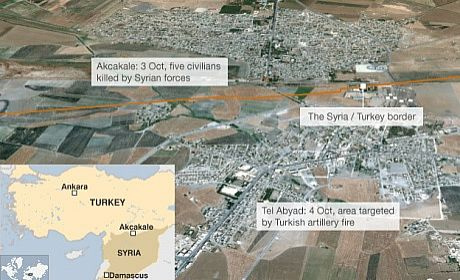War Is To Assad’s Disadvantage

Some analysts believe that Syria's objective in launching shells on Turkey’s border regions is to impact the domestic crisis and create a foreign war to cover up the civil war in this country. Is this analysis, in your opinion, correct? To what extent, do you think, the government of Bashar Assad will be able to achieve this goal if a war occurs between Turkey and Syria, hoping to create domestic unity and suppress the opposition by strengthening nationalism?
Since a few months ago, Bashar Assad’s armed opponents have attempted to capture northern parts of Syria, especially between Aleppo and the Turkish border, by using financial aids from Saudi Arabia and Qatar and Libya's help in training and military assistance and also through the political and military support of the government of Turkey, and they have tried to expel Syrian government forces from this country's border with Turkey. But, despite numerous efforts and bloody clashes, this objective has not yet been achieved. Perhaps, the exchange of fire between Syrian and Turkish forces is indicative of the lack of success on the part of the armed opponents of Syria's government in taking control of the border out of the hands of government forces. On the other hand, the government of Syria is also willing to show to the foreign supporters of the armed groups that it is still militarily present in this country's borders so that a country like Turkey would not feel that, by using Assad’s armed opposition and Al-Qaeda elements who have entered Syria from Arab countries, they can rapidly bring its desired government to power. It must be noted that the occurrence of any war between Syria and Turkey will be to Bashar Assad's disadvantage and will raise the hopes of the armed opposition groups for victory. Of course, the people of Syria do not want the destiny of their government to be determined by the government of Turkey, which is a NATO ally and which has a bad record of exploiting the people of Syria during the Ottoman government. But, under the present circumstances, the people of Syria are victims of foreign interventions and feel that, if foreign governments determine their fate, they will remain outside of the scene of the country’s governance.
What will the dimensions of war between Syria and Turkey be? Does the Syrian army have the capability to enter into a war with Turkey? Considering Turkey's membership in NATO, how possible is the entrance of NATO forces in the war?
Considering Turkey's membership in NATO and NATO’s commitment to support allied countries, it is possible that the occurrence of war between Turkey and Syria could lead to military intervention by NATO. Of course, under the present conditions where NATO is involved in Afghanistan and the number of its killed officers is growing, NATO commanders are naturally less willing to involve themselves in a new war, especially a war near the borders of Occupied Palestine; because this war would possibly be to Israel's disadvantage. Nevertheless, it seems that the government of Syria does not welcome war, but from the viewpoint of western countries and the governments of Turkey and Saudi Arabia, war between Syria and Turkey can be a solution and a formula for limited military intervention to help armed opponents of Bashar Assad to topple his government. Of course, it seems that this war will not happen until next month when the US presidential election is to be held. But, after the result of the election becomes clear, the Syrian situation will be a critical one.
What will the reaction of the supporting forces of Syria be with regard to a possible war between Syria and Turkey? Will Syria support Bashar Assad in this war? What will Iran's reaction be? What impacts will this war have on Tehran-Ankara relations?
The Islamic Republic of Iran opposes any kind of foreign intervention in Syria, especially imposing war on this country. Iran, through diplomatic means, will attempt to prevent Turkey from beginning a war with Syria and explain the unpleasant consequences of war to the government of Turkey. Naturally, if Turkey's military forces attempt to enter into a war with Syria, the government of Turkey will be faced with domestic opposition and the popularity of the government of justice and development will be reduced. Nevertheless, Iran and Turkey, despite their obvious differences of opinion with regard to the issue of Syria, have so far made efforts to expand their economic relations and prevent the creation of tension in their political relations; but the occurrence of war may change this situation.
What would the impacts of this war be on the general atmosphere of the region, particularly on the Arab Spring? Won't this war securitize the regional atmosphere and destroy the aim of democracy?
Basically, the West's intervention in controlling popular movements in Arab countries slowed down the trend of democratization in these countries and the people became worried about the military intervention of foreign countries. On the other hand, the emergence of Salafi and al-Qaeda groups in countries where the dictators had fallen has narrowed the atmosphere of freedom-seeking for the people and increased concerns about radicalism. Governments like Saudi Arabia and Qatar, which are monarchies, attempt to use this opportunity to strengthen the monarchial structure in their countries and spend huge amounts of money for this cause to make the positions of the governments of Egypt, Tunisia, and Libya compatible with their own policies. The occurrence of war will intensify this atmosphere and close the path for the formation of democratic governments in the Middle East. Principally, one of the methods used by arrogant powers to rule the world is to create wars in order to continue their hegemony, and dictators will welcome the occurrence of managed wars, for the atmosphere will be prepared for intensified oppression and expanded dictatorship.

